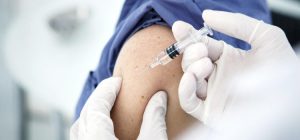Colder weather leads to increases in COVID, flu cases
November 1, 2022

Illinoisans are strongly encouraged to get the COVID-19 booster shot and flu shot at the same time in order to achieve maximum protection ahead of the winter respiratory virus season.
The Illinois Department of Public Health (IDPH) has reported an increase in the number of counties at an elevated level for COVID-19. IDPH Director Dr. Sameer Vohra is urging Illinoisans to get fully protected with the new bivalent booster shots and the flu vaccine before the holidays arrive. The new bivalent COVID-19 booster shots are designed to offer added protection from the now-dominant strains of the Omicron variant.
The CDC released data showing that 38 counties in Illinois are at an elevated community level for COVID-19, up from 26 counties last week. Five counties are rated a High level and 33 are at Medium. IDPH is reporting 13,642 new confirmed and probable cases of COVID-19 in Illinois, and 67 deaths since Oct. 21.
“This uptick makes it critically important for everyone to use the tools that are available to protect yourself and your family,” said Vohra. “Vaccines remain the most powerful tool to prevent serious illness. If you have not gotten the COVID-19 booster and a flu shot for yourself and your eligible children, now is a great time. I recommend everyone in Illinois get fully protected. And if you are feeling sick, please stay home, get tested, and call your doctor for help. I encourage all Illinoisians to do all they can to stay safe and healthy as the holiday season approaches.”
Vohra recently got both his COVID-19 booster shot and his flu shot at the same time and urges another Illinoisans to do the same, in order to achieve maximum protection ahead of the winter respiratory virus season.
IDPH is working with the Illinois Chapter of the American Academy of Pediatrics (ICAAP) to encourage physicians and parents to ensure children are fully protected from COVID-19 and the flu.
IDPH reported that last two week, an average of more than 26,000 doses of the new bivalent vaccines were administered across the state each day. This is more than triple the daily average for all vaccinations for most of the summer.

IDPH Director Dr. Sameer Vohra
The CDC authorized two new bivalent booster vaccines on Sept. 1 that include an mRNA component of the original strain to provide an immune response that is broadly protective against COVID-19 and an added mRNA component in common between the omicron variant BA.4 and BA.5 lineages to provide better protection against COVID-19 caused by the omicron variant.
Initially, the Moderna COVID-19 Vaccine, Bivalent, was authorized for use as a single booster dose in individuals 18 years of age and older and the Pfizer-BioNTech COVID-19 Vaccine, Bivalent, was authorized for use as a single booster dose in individuals 12 years of age and older. On Oct. 12, the CDC authorized the updated COVID-19 vaccines from Pfizer-BioNTech for children ages 5 through 11 years, and from Moderna for children and adolescents ages 6 through 17 years.
The updated boosters are available at pharmacies, hospitals, and other healthcare providers. The best way to locate a vaccine provider near you is to visit www.vaccines.gov and search for bivalent booster availability.
Currently, IDPH is reporting a total of 3,809,680 cases, including 35,235 deaths, in 102 counties in Illinois since the beginning of the pandemic.
As of last week, more than 1,000 individuals in Illinois were reported to be in the hospital with COVID-19. Of those, 129 patients were in the ICU and 48 patients with COVID-19 were on ventilators. The preliminary seven-day statewide case rate is 107 COVID-19 cases per 100,000 Illinoisans.
The CDC recommends the following measures for people in areas that are rated at High Community Level for COVID-19 transmission:
- Wear a well-fitting mask indoors in public, regardless of vaccination status (including in K-12 schools and other indoor community settings)
- If you are immunocompromised or high risk for severe disease
- Wear a mask or respirator that provides you with greater protection
- Consider avoiding non-essential indoor activities in public where you could be exposed
- Talk to your healthcare provider about whether you need to take other precautions
- Have a plan for rapid testing if needed (e.g., having home tests or access to testing)
- If you test positive: Talk to your healthcare provider about whether you are a candidate for treatments like oral antivirals, and monoclonal antibodies
- If you have household or social contact with someone at high risk for severe disease
consider self-testing to detect infection before contact and consider wearing a mask when indoors with them
- Stay up to date with COVID-19 vaccines and boosters
- Maintain improved ventilation throughout indoor spaces when possible
- Follow CDC recommendations for isolation and quarantine, including getting tested if you are exposed to COVID-19 or have symptoms of COVID-19
In counties at the Medium Community Level, persons who are elderly or immunocompromised (at risk of severe outcomes) are advised to wear a mask in indoor public places. They should also get up to date on COVID-19 vaccines or get their bivalent booster, if eligible.
IDPH has been supporting pharmacies and healthcare providers in efforts to increase their inventories of the various FDA-authorized treatments. There are over 1,200 treatment locations in Illinois – including all the major retail pharmacies. More than 96.7 percent of the state’s population is within a 10-mile radius of one of these locations.
A total of 24,661,690 vaccines have been administered in Illinois. The seven-day rolling average of vaccines administered daily is 27,509 doses, including the bivalent booster and first doses.







